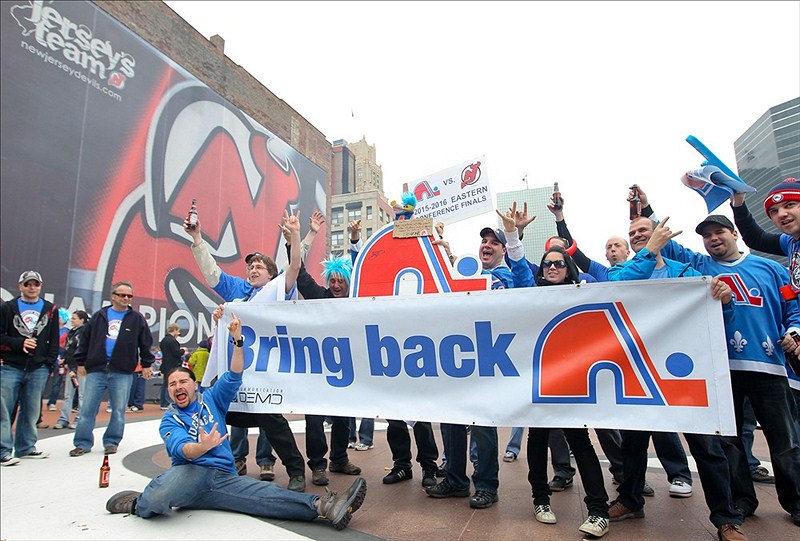Few things are more irritating than a Johnny-or-Jane-come-lately who expects reverence.
This being the case, most “fair-weather fan” accusations are perfectly valid.
“Don’t tell me who’s gonna be in the finals. How would you know?” is what Johnny needs to hear.
“Take off that hat and stop talking about how you wanna bang the team,” might keep Jane quiet.
Yes, the fan life is a frivolous, immature one characterized by irrational outbursts and childish tantrums. We humans have a need to behave like idiots and “at the game” is one excuse for idiocy that occasionally works. Charging others with fair-weatherism is a common manifestation of this goofiness and this commonality makes the indictment relevant.

Watching sports is supposed to be enjoyable and there is nothing enjoyable about watching your team consistently lose. This is especially true for puck-snobs. These dismissers have only one sport to enjoy, and believe in its vast superiority to all others. For this reason, hockey fans can be shockingly melodramatic.
A team that keeps losing, and losing, and losing, is not worth time or money. Shame, disappointment and rage are unhealthy feelings. Literature on morale affecting the body is eminent: eminent enough to admit continuously watching the Sabres, the Flyers, and at the moment, the Red Wings, can be hazardous.
Notice I only claim watching games to be this way. A fan can be knowledgable without watching a second of hockey for an entire season. Reading, listening, and dabbling in highlight reels is how to educate oneself without damaging oneself. True, these are not enjoyable ways of spending one’s time either, but they remain healthy alternatives to increased blood pressure with no gratifying release, damage to property, astonishing levels of blood-alcohol content, depression, isolation, violence, and incarceration.
I have seen these things happen, and it is frightening.

Imagine you are a fan of a show that will run for the rest of your life.
The first five seasons of this show presented you with the finest on-screen storytelling ever seen. Deep, complex, inspiring characters; rich, layered, elegant writing; evocative, beautiful, dramatic music; colorful, mouth-watering, iconic photography, all would be inadequate descriptions of the show’s greatness. Then, at the end of season five, the central character is surprisingly killed off. Season six offers paltry explanations for the character’s death. Ratings begin to dip. The show’s budget is suddenly cut. The show’s creator focuses on other projects. The show’s writers do the same. The studio panics and brings in unprepared replacements. The show is no longer the best thing you have ever seen. It is not even good anymore. It is barely mediocre. The show, in a word, sucks and will air every week for the next forty years. How long could you keep watching?
It’s true most sports franchises do not work this way. Outside a few exceptions, teams succeed, diminish, fail and then rise again for new generations to enjoy. Sooner or later, wherever you are, your home team will find success. But the show analogy is what inquisitors demand fair-weather fans endure, technically. And suppose you are from a city whose team will never win anything. There are people who have spent decades, lifetimes, hopelessly waiting for “this year” to be “the year.” You could be one of these people. What if an omniscient being suddenly appeared before you and declared with authority, “The so-and-sos will not win before you die! They will always suck! Raise your children somewhere else or they will be miserable!”? How would fair-weatherism sound then?

This would be a good time to distinguish the different fair-weatherists from each other.
First, we have the pragmatic fair-weatherist. This person, while still a loathsome opportunist, pledges allegiance to a team for social benefits. They are often new to a city and seek to establish themselves in unfamiliar territory. This is understandable. Loneliness in a new city is extremely unpleasant, and familiarizing oneself with the home team can mitigate the effects of a solitary life.
A less acceptable form of fair-weather pragmatism is the desire to be noticed. These fans know nothing, and care, really care, even less. They travel in groups, sport the home team colors, feign enthusiasm and cheer insincerely. These fans tend to be women, because it is riskier to be an unaccompanied woman than an unaccompanied man. Biology, presumably, is a reason for this.
The male version of this fan is even more abhorrent. He is plagued by an all-encompassing insecurity, and enjoying anything outside the home by himself is impossible. He lacks the minimal degree of courage necessary to have a meal alone, see a movie without a friend, go solo on a trip, or participate in any activity that could attract petty criticism. These are not men, but the “Mean Girls” of the male sex.

The third and most acceptable form of fair-weatherism results from sheer fatigue and disgust. These fans have had enough. They feel their team has betrayed them, and refuse to reward, or even acknowledge, this betrayal. The team’s play has risen to the level of personal insult, and these people have enough things to fret about without adding unnecessary stress to their lives. These fans, if numerous and noisy enough, can contribute to a team turning things around. Owners can profit without winning, but cannot profit without fans. After reviewing my argument, it’s clear only this final form of fair-weatherism should be immune to criticism.
When confronted with fair-weather inquisitors, I’m reminded of the scene in “Platoon” where Sergeant Barnes grunts at a wailing soldier to, “Take the pain.”
Well, f$%@ you, Barnes. We have better things to do.
Follow Ian on Twitter: https://twitter.com/ianflemingdunha
Thanks, Ross.
You never disappoint.